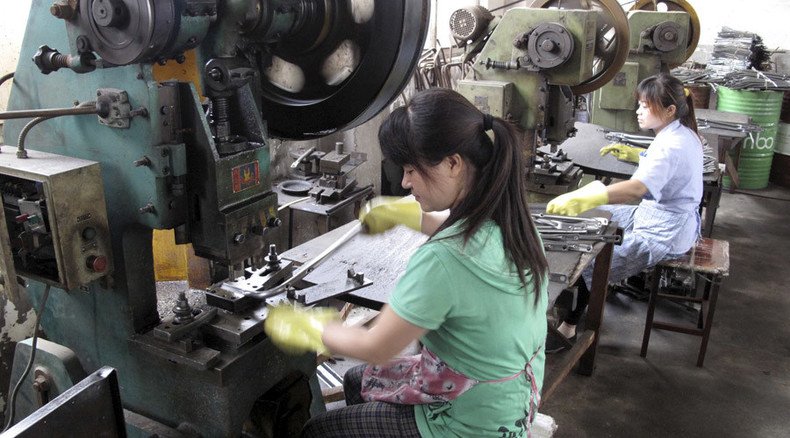China rattles markets as manufacturing shrinks to 78-month low

Factory activity in China continued to contract in September hitting a six-and-a-half year low, according to the Caixin China Purchasing Managers' Index (PMI). The index registered 47, where any reading below 50 means an economic slowdown.
This is the worst result since March 2009, and is the seventh month in a row factory activity has fallen.
"The principle reason for the weakening of manufacturing is tied to previous changes in factors related to external demand and prices," said Dr. He Fan, chief economist and director of research at Caixin Insight Group.
READ MORE:
Markets slide with China’s manufacturing down to 6-year low http://t.co/ot2pOZiP8upic.twitter.com/aCYaCw5QXV
— RT (@RT_com) September 1, 2015"Fiscal expenditures surged in August, pointing to stronger government efforts on the fiscal policy front. Patience may be needed for policies designed to promote stabilization to demonstrate their effectiveness," he added.
The markets are clear that the Xi Jinping government’s goal to reach seven percent growth isn’t feasible.
"The weaker than expected PMI suggested domestic and external demand remained sluggish. It's almost certain China's economic growth will slide below 7 percent in the second half of this year," economists at Minsheng Securities told Reuters.
READ MORE:
Forex reserves in China down by $93.9bn – setting a new record http://t.co/JCfUgnZGpxpic.twitter.com/wQ61PCcS5t
— RT (@RT_com) September 7, 2015The final PMI index for September will be released on October,1.
Asian markets responded negatively on Wednesday to the factory activity contraction. Investors turned to safer assets such as government bonds amid fears of a weakening world economy.
The Shanghai Composite was 2.19 percent down at the close, Japan's Nikkei lost 1.96 percent, the Hang Seng dropped 2.28 percent and Taiwan’s TSEC 50 Index was 2.06 percent in the red. This was the biggest drop for Asian markets this month since ‘Black Monday’ at the end of August.
READ MORE:
Black Monday: ‘No reason to flip out, overinflated markets are just telling truth’ http://t.co/PJ9AJJjzm4pic.twitter.com/3OAP8bSMsL
— RT (@RT_com) August 25, 2015"The industrial sector in China remains a concern, indicating that the economy is not out of the woods yet, while the Fed's comments last week indicate a glass half-empty view of the global economy," Tai Hui, chief Asia markets strategist at JP Morgan Asset Management in Hong Kong told Reuters.
LISTEN MORE:












